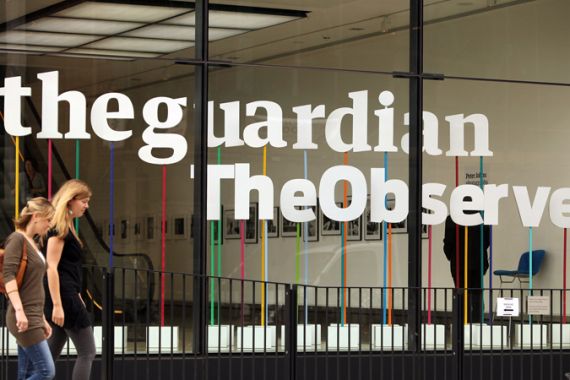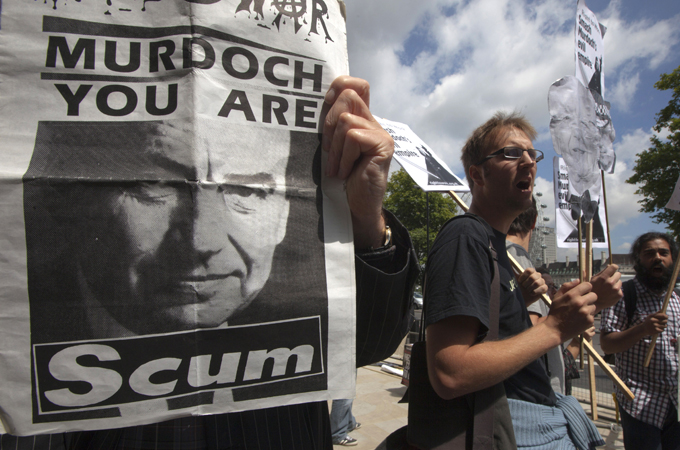UK police seek phone-hacking sources’ names
London police seeks production order under Official Secrets Act to force newspaper to reveal sources.

 |
| The phone-hacking scandal ignited public furore and led to the resignations of several senior officials [GALLO/GETTY] |
British police are demanding that the newspaper which broke the phone-hacking scandal involving Rupert Murdoch’s News Corp media empire reveal some of its sources on the story, the paper has said.
In a story published on its website on Friday, the Guardian said that London’s Metropolitan Police was seeking a court order under the Official Secrets Act in order to force its reporters to reveal the identities of confidential sources.
The act in question is designed to protect classified information and is usually applied to matters of national security and espionage.
The Met police said that it was seeking a “production order” against the Guardian and one of its reporters over potential breaches of the act. The application will be heard at a London court on September 23, the paper reported.
“Operation Weeting [the phone-hacking inquiry] is one of the [Metropolitan Police Service’s] most high-profile and sensitive investigations so of course we should take concerns of leaks seriously to ensure that public interest is protected by ensuring there is no further potential compromise,” the police said in a statement.
The force also paid tribute to “the Guardian‘s unwavering determination to expose the hacking scandal and their challenge around the initial police response” and was not trying to prevent investigative journalism.
Newspaper’s response
Alan Rusbridger, the editor of the newspaper, said that the Guardian would “resist this extraordinary demand to the utmost”.
He also condemned the use of the Official Secrets Act.
“It’s such heavy weaponry to be used over something that’s not really about official secrets,” he told the Associated Press news agency.
Rusbridger said that, given the context, the police demand for source information was “ill-judged, certainly in PR terms, and in terms of the relationship that the Met is trying to reset with the media”.
The newspaper’s reports on the phone-hacking scandal revealed that the News of the World tabloid had routinely intercepted the voicemails of those in the public eye, including that of Milly Dowler, a missing schoolgirl who was later found murdered.
The media focus helped to keep the issue at the top of the political agenda in Britain, and played a part in forcing News Corp to shut down the 168-year-old News of The World.
The scandal also forced News Corp to abandon a bid to buy the part of pay TV group BSkyB that it did not already own.
Britain’s most senior police officer and counterterrorism chief both quit amid a growing furore over how the police handled their investigation into the scandal.
Rebekah Brooks, the chief executive of News International, the British newspaper arm of News Corp, also resigned amid the scandal.
Detectives are continuing their investigation into the phone-hacking allegations, and have already arrested 16 people, including Brooks and Andy Coulson, a former editor of the News of the World who went on to work as the media chief of David Cameron, the British prime minister.
Confidential information
One of the detectives working on the case was arrested and suspended last month on suspicion of leaking confidential information about the case.
Amelia Hill, one of the Guardian‘s reporters on the story, has already been questioned by police investigators looking into the leaks.
Geoffrey Robertson, a leading human rights lawyer, criticised the way the police has been conducting its inquiry into the phone-hacking scandal, particularly of the fact that the police accepted the News of the World‘s initial defence that the hacking had only been carried out by lone reporter.
“I think the police have acted extremely stupidly in the course of this whole matter from the time they allowed only one journalist to be prosecuted and this is another example,” he said in an interview with the Reuters news agency.
“Using the official secrets act to obtain a journalist’s source is really something of an outrage.
“Police maybe think they can take these liberties against good journalists because there are so many bad ones out there.”
Michelle Stanistreet, the head of Britain’s journalists’ union, was also critical of the police’s move.
“Journalists have investigated the hacking story and told the truth to the public,” she said in a statement. “They should be congratulated rather than being hounded and criminalised by the state.”